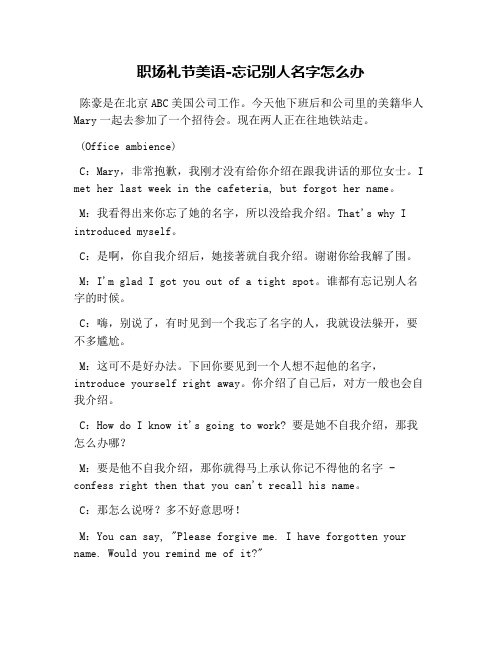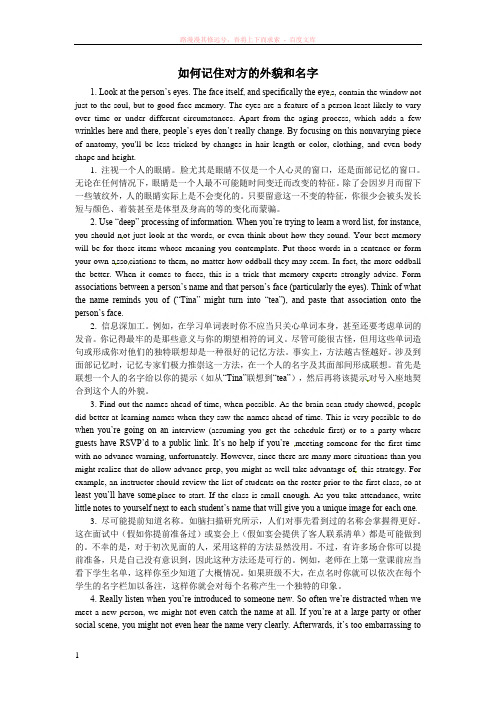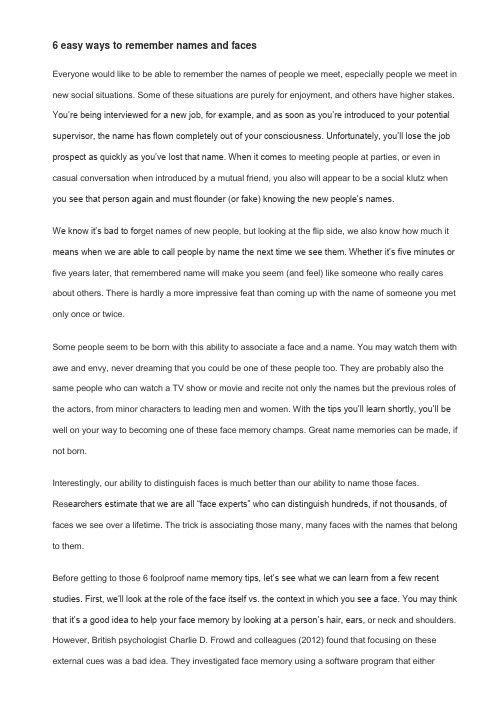英文阅读:忘记别人名字的几种原因
- 格式:docx
- 大小:16.22 KB
- 文档页数:4

忘记用英语怎么说忘记也是记忆功能的一种,它使得人只保留重要的、相关的信息,减轻大脑空间压力。
那么你知道忘记用英语怎么说吗?下面跟店铺一起学习忘记的英语知识吧。
忘记的英语说法forgetneglectslip from one's memory忘记的相关短语永不忘记 Never Forget ; Never to forget不能忘记 Unforgettable ; Twins Girls ; not forget ; Not afford to forget忘记你 oh baby ; Forget You ; OVER YOU ; Getting Over You忘记了forget about ; Forgotten ; slip one's memory ; slip one's mind忘记做 Forget to do ; bark ; have a good time ; hunt忘记的 oblivious ; forgetful记得忘记 remember to forget ; Remember that forget忘记台词 blow one's lines ; blow ; hit the grid ; be fluffy最好忘记 Better best forgotten忘记的英语例句1. Don't forget, I have always kept the money rolling in.不要忘记,我总是有大量钱财滚滚而来。
2. Don'tforget that all dogs need a supply of fresh water to drink.不要忘记所有的狗都需要喝新鲜的水。
3. For a few brief minutes we forgot the anxiety and anguish.短短几分钟我们就忘记了焦虑与苦恼。

职场礼节美语-忘记别人名字怎么办陈豪是在北京ABC美国公司工作。
今天他下班后和公司里的美籍华人Mary一起去参加了一个招待会。
现在两人正在往地铁站走。
(Office ambience)C:Mary,非常抱歉,我刚才没有给你介绍在跟我讲话的那位女士。
I met her last week in the cafeteria, but forgot her name。
M:我看得出来你忘了她的名字,所以没给我介绍。
That's why I introduced myself。
C:是啊,你自我介绍后,她接著就自我介绍。
谢谢你给我解了围。
M:I'm glad I got you out of a tight spot。
谁都有忘记别人名字的时候。
C:嗨,别说了,有时见到一个我忘了名字的人,我就设法躲开,要不多尴尬。
M:这可不是好办法。
下回你要见到一个人想不起他的名字,introduce yourself right away。
你介绍了自己后,对方一般也会自我介绍。
C:How do I know it's going to work? 要是她不自我介绍,那我怎么办哪?M:要是他不自我介绍,那你就得马上承认你记不得他的名字 - confess right then that you can't recall his name。
C:那怎么说呀?多不好意思呀!M:You can say, "Please forgive me. I have forgotten your name. Would you remind me of it?"C:这么说倒是不错。
对了,我还能够说我记得上星期在餐厅里见到她的。
这样也许更好一些。
M:对,这样他就知道你没有全忘了他C:谢谢你,Mary!明天见。
C:Mary,我还是第一次在这餐厅吃午饭,饭菜真不错,价廉物美。
哟,不好了。
M:What?C:你看,那正在往这儿走的女士,昨天在Mr. Jones的办公室里见到她,可我现在记不得她的名字了。

小学英语单词记忆难的原因以及对策针对小学生在英语词汇学习中存在的困难,教师有必要使学生对提高词汇学习的信心,消除畏惧心理。
小偏整理了小学英语单词记忆难的原因以及对策,感谢您的每一次阅读。
小学英语单词记忆难的原因1、缺乏对单词记忆的正确态度由于小学生年龄小、好动好玩,有部分学生平时很少花时间用在英语单词的复习上,没有及时巩固,遗忘性很大,不到一个月就忘得一干二净。
不远的将来,单词势必成为这部分学生英语学习过程中的一只拦路虎。
2、遗忘率较高,学生认读单词存在较大困难小学生主要把英语单词学习的重点放在听说、认读单词上。
由于对英语的基本音标缺少有效的积累,面对遗忘的单词有些学生会不知所措。
一部分学生开始产生恐惧情绪,对英语望而生畏,从而挫伤了学生学习英语的积极性和自信3、缺乏必要的单词记忆策略和技巧,自主学习能力差4、难以读准单词,且受汉语拼音干扰学生对于陌生的英语语音不易识别,因此,往往错误地把一些英语语音等同本国语的语音,如[e]发成拼音中的“ai”,将 [i]念成拼音的“i”。
也有的学生为了快速记住单词读音,就用汉语为其“注音”。
如把“ pencil”发成“派收”,“crayon”单词旁边注册发音“克雷恩”。
这对于某些单词短时内易于记忆,但是非常不准确、不科学,因此,教师应千方百计改进单词教学,使学生顺利过好单词关,这确实搞好小学英语教学至关重要的一环。
探索提高小学生词汇记忆能力的对策1、帮助端正学习态度,让每个学生都扬起自信的风帆教师时刻要注意用师爱去培育学生的自信心。
当学生取得成功时,给他一个赞赏的微笑,跷起大拇指说句“good”或“excellent”,也可让全体学生他表扬。
让学生感受成功的快乐,变得更加自信。
当学生碰到困难时,用“try it again”等及时给予鼓励。
2、注重示范,让学生准确模仿读音。
3、利用直观教具如实物、图片、图形、玩具等教学生词。
4、指导记忆策略,提高记忆效率遗忘率较高造成小学生认读单词困难。

你为什么会记不住别人名字?大多数人都经历过这种情况:被介绍给一位陌生人,但没过几秒就把他们的名字忘了个一干二净。
但究竟为什么人们很容易记住别人的脸、却很难记住他们的名字呢?被介绍给一位陌生人,但没过几秒可能就把他们的名字忘了个一干二净。
科学家认为这与大脑处理随机数据的方式有关。
此外,如果我们对某个人不感兴趣,也就很难记住这类信息。
该视频名为“你为什么会忘记别人的名字?”,由YouTube上AsapScience 频道的米歇尔·墨菲特(Mitchell Moffit)和格雷格·布朗(Greg Brown)制作。
他们解释道,我们的大脑擅长识别面部细节,而脑部扫描也发现,当实验者看到一张人脸时,特定区域的脑细胞会出现明显的反应。
脑部扫描也发现,当实验者看到一张人脸时,特定区域的脑细胞会出现明显的反应。
例如,多伦多大学的研究发现,当实验对象在密集的人群中搜寻人脸时,大脑前额叶会向后部视觉皮层发送信号,以强化实验对象看到的景物。
但人名属于随机数据,不包含任何具体信息,因此大脑很难记住它们。
如果大脑无法在各种信息碎片之间建立起联系,尤其是那些对于个体来说已经熟悉了的信息,大脑就很容易忘记它们。
人们初次会面时,很多人都会专注于自我介绍,这就是所谓的“想当然”效应。
大脑会按照自己的规矩来,思考自己该说些什么、怎么说,而不是注意观察和聆听别人。
而我们无法同时输入和输出信息。
在由德克萨斯基督教大学进行的一项实验中,研究者让一组研究对象轮番做自我介绍。
然后对他们进行测试,看看他们记住了多少信息。
结果发现,每名志愿者都能精确地记住别的成员的信息,唯独记不住在自己之前的那位,而且几乎一点儿都记不起来。
这是因为,大脑既有短期记忆,又有长期记忆,短期记忆往往又被称为“工作记忆”。
它只能记住这么多信息,而如果大脑不够专注,或没有进行重复记忆,这部分信息就会被遗忘了。
重复对记忆的重要性在许多学习类app上都可以体现出来,如语言学习平台Memrise。

如何记住对方的外貌和名字1. Look at the person’s eyes. The face itself, and specifically the eye s, contain the window not just to the soul, but to good face memory. The eyes are a feature of a person least likely to vary over time or under different circumstances. Apart from the aging process, which adds a few wrinkles here and there, people’s eyes don’t really change. By focusing on this nonvarying piece of anatomy, you'll be less tricked by changes in hair length or color, clothing, and even body shape and height.1. 注视一个人的眼睛。
脸尤其是眼睛不仅是一个人心灵的窗口,还是面部记忆的窗口。
无论在任何情况下,眼睛是一个人最不可能随时间变迁而改变的特征。
除了会因岁月而留下一些皱纹外,人的眼睛实际上是不会变化的。
只要留意这一不变的特征,你很少会被头发长短与颜色、着装甚至是体型及身高的等的变化而蒙骗。
2. Use “deep” processing of information. When you’re trying to learn a word list, for instance, you should n ot just look at the words, or even think about how they sound. Your best memory will be for those items whose meaning you contemplate. Put those words in a sentence or form your own a sso ciations to them, no matter how oddball they may seem. In fact, the more oddball the better. When it comes to faces, this is a trick that memory experts strongly advise. Form associations between a person’s name and that person’s face (particularly the eyes). Think of what the name reminds you of (“Tina” might turn into “tea”), and paste that association onto the person’s face.2. 信息深加工。

6 easy ways to remember names and facesEveryone would like to be able to remember the names of people we meet, especially people we meet in new social situations. Some of these situations are purely for enjoyment, and others have higher stakes. You’re being interviewed for a new job, for example, and as soon as you’re introduced to your potential supervisor, the name has flown completely out of your consciousness. Unfortunately, you’ll lose the job prospect as quickly as you’ve lost that name. When it come s to meeting people at parties, or even in casual conversation when introduced by a mutual friend, you also will appear to be a social klutz when you see that person again and must flounder (or fake) knowing the new people’s names.We know it’s bad to for get names of new people, but looking at the flip side, we also know how much it means when we are able to call people by name the next time we see them. Whether it’s five minutes or five years later, that remembered name will make you seem (and feel) like someone who really cares about others. There is hardly a more impressive feat than coming up with the name of someone you met only once or twice.Some people seem to be born with this ability to associate a face and a name. You may watch them with awe and envy, never dreaming that you could be one of these people too. They are probably also the same people who can watch a TV show or movie and recite not only the names but the previous roles of the actors, from minor characters to leading men and women. Wit h the tips you’ll learn shortly, you’ll be well on your way to becoming one of these face memory champs. Great name memories can be made, if not born.Interestingly, our ability to distinguish faces is much better than our ability to name those faces.Res earchers estimate that we are all “face experts” who can distinguish hundreds, if not thousands, of faces we see over a lifetime. The trick is associating those many, many faces with the names that belong to them.Before getting to those 6 foolproof name memory tips, let’s see what we can learn from a few recent studies. First, we’ll look at the role of the face itself vs. the context in which you see a face. You may think that it’s a good idea to help your face memory by looking at a person’s hair, ears, or neck and shoulders. However, British psychologist Charlie D. Frowd and colleagues (2012) found that focusing on these external cues was a bad idea. They investigated face memory using a software program that eitherhighlighted, altered, or removed completely the external cues such as hair and even ears. The software is used in providing composite pictures of potential suspects in an eyewitness situation. In a series of experiments, Frowd and his team showed definitively that people are most likely to remember faces when they do not look at those external cues. The best recognition occurred when people saw the faces without the distraction of the surrounding information.In the second experiment, conducted by University of Victoria neuroscientists Iris Go rdon and James Tanaka (2011), participants looked at faces and names while hooked up to a brain scan that measured the brain’s electrical response to stimuli. The question they investigated pertains to the timing of our acquisition of faces and names. To make a very complex story short, Gordon and Tanaka concluded that one of the reasons we forget a person’s name is that we see the person before we know the person’s name. Knowing the name first gives you an anchor that you can use later to associate with th e person’s face. This isn’t always practical, but as I’ll point out later, it’s definitely a useful strategy in many situations.Finally, let’s look at an experiment conducted at Tokyo Gakugei University in Koganei, Japan by Takahiro Sekiguchi (2011) which shows the tricks used by people good at face memory. Participants were hooked up to an eye movement tracker while they looked at new faces. Name memory wasn’t actually measured in this study, but the findings shed light on what people with good face memory actually do. Those participants with the best face memory, when looking at the faces they would be tested on, fixated most of their attention on the eye region. They did not look significantly at any other part of the face, including the nose, mouth, chin, hair, cheeks, ears, or even forehead. To remember a face, you need to look right at the person’s eyes.Now let’s put these studies together with some other facts about memory for our six face memory tips.Look at the person’s eyes. The face itself, a nd specifically the eyes, contain the window not just to the soul, but to good face memory. The eyes are a feature of a person least likely to vary over time or under different circumstances. Apart from the aging process, which adds a few wrinkles here and there, people’s eyes don’t really change. By focusing on this nonvarying piece of anatomy, you’ll be less tricked by changes in hair length or color, clothing (which definitely changes), and even body shape and height (which also change).Use “deep” processing of information . When you’re trying to learn a word list, for instance, you should not just look at the words, or even think about how they sound. Your best memory will be for those items whose meaning you contemplate. Put those words in a sentence or form your own associations to them, no matter how oddball they may seem. In fact, the more oddball the better. When it comes to faces, this is a trick that memory experts strongly advise. Form associations between a person’s name and that person’s face (particularly the eyes). Think of what the name reminds you of (“Tina” might turn into “tea”), and paste that association onto the person’s face. This National Geographic special shows an impressive memory expert showing his tricks for learning names (20 at once!).Find out the names ahead of time, when possible . As the brain scan study showed, people did better at learning names when they saw the names ahead of time. This is very possible to do when you’re going on an interview (assuming you get the sche dule first) or to a party where guests have RSVP’d to a public link. It’s no help if you’re meeting someone for the first time with no advance warning, unfortunately. However, since there are many more situations than you might realize that do allow advanc e prep, you might as well take advantage of this strategy. For example, an instructor should review the list of students on the roster prior to the first class, so at least you’ll have someplace to start. If the class is small enough. As you take attendanc e, write little notes to yourself next to each student’s name that will give you a unique image for each one (such as "Jim" looks like he goes to the "gym").Really listen when you’re introduced to someone new . So often we’re distracted when we meet a ne w person, we might not even catch the name at all. If you’re at a large party or other social scene, you might not even hear the name very clearly. Afterwards, it’s too embarrassing to ask it again (or so you think). If you give yourself an extra second to process that name together with the face, it will increase the odds astronomically that you’ll remember the name and face better. Also, you don’t have to be embarrassed about asking for a person’s name a second time (or even third). This even can enhance your social standing because you’ll look like a person who at least making an effort. If you're lucky, people will have name tags, so add the visual to the auditory cues, and you'll be good to go.Practice the face-name game at home. Practicing celeb’s na mes is a low-risk way to enhance your face memory skills. As you’re watching your favorite movies or TV shows at home, go ahead and consult a movie or TV data base, which will allow you to work on forming name-face associations with peoplewhose feelings y ou can’t possibly hurt. You can also diagnose your weaknesses with this simple exercise. Perhaps you’re worse at remembering men’s names, or perhaps you look too much at the changing features of a person’s costumes and disguises. You can even work out a sc oring system and track your progress as the weeks go by.Relax! As I pointed out in an earlier blog post (which reinforces some of the points made here), when you’re stressed, your body’s endocrine system unleashes cortisol through your bloodstream. Corti sol is a definite killer of all sorts of memories, including (and perhaps especially) the type of memory involved in recalling names. In that interview situation, for example, you may be so focused on how horribly your feeling that in those first few secon ds you don’t engage in deep name-face processing. As the interview goes by, your stress levels can increase to dangerous levels, particularly if you start worrying about how you’re going to bid good bye to a person whose name has completely exited your bra in. That person will certainly know your name, so if you’re going to make a great impression, you should return the favor. You’ll do that fantastically if you take that one teeny extra second at the beginning to work on deep processing of that person’s nam e.The most important key to name memory is to believe that you can do it. If you’ve decided that you’re a hopeless case, your lack of confidence will only make things worse. Build your name memories one person at a time, and pretty soon it’s your friends who will envy your great social skills!References:Frowd, C. D., Skelton, F., Atherton, C., Pitchford, M., Hepton, G., Holden, L., &... Hancock, P. B. (2012). Recovering faces from memory: The distracting influence of external facial features. Journal Of Experimental Psychology: Applied, 18(2), 224-238. doi:10.1037/a0027393 Gordon, I., &Tanaka, J. W. (2011). Putting a name to a face: The role of name labels in the formation of face memories. Journal Of Cognitive Neuroscience, 23(11), 3280-3293. Sekiguchi, T. (2011). Individual differences in face memory and eye fixation patterns during face learning. Acta Psychologica, 137(1), 1-9.doi:10.1016/j.actpsy.2011.01.记住名字和脸的六个简易方法摘要:如何记住初次见面的人脸部及名称可不是件容易的事。
英语阅读理解题出错原因有哪些英语阅读理解题出错原因有哪些做英语阅读理解的时候,为什么总是会出错呢,下面小编为大家带来了英语阅读理解题出错原因,希望能够帮助到大家。
1. 张冠李戴命题者把文章作者的观点与他人的观点混淆起来,题干问的是作者的观点,选项中出现的却是他人的观点;或者题干问的是他人的观点,却把作者的观点放到选项中去。
以2006年全国卷I第60题“The author planned to stop at Oklahoma City______.”为例。
此题乍看C项“to pay at the cash register”和D项“to have more gas for his car”都对,因为原文中有这么一句“While I Was standing in line at the cash register,I said hello to an older couple who were also paying for gas”。
很明显作者是停下来付款加油时,偶遇一对老夫妇并问好,似乎选项C和D本身都没错,但题干问的是“作者计划在俄克拉荷马市逗留的原因”,如果考生没有理解题干,就会误选C项或D项。
正确选项应为A项“to visit a friend”。
2. 偷梁换柱干扰项用了与原文相似的句型结构和大部分相似的词汇,却在不易引人注意的地方换了几个词汇,造成句意的改变。
以2006年全国卷I第57题“It can be inferred that greyhounds_______. ”为例。
此题乍看应选B项“like staying in bed al l day”,因为原文中有这么一句“especially they would much rather be at home in bed than walking around outside”. 殊不知选项中加了“all day”,使意思绝对化了。
英文小说中人名有时是名,有时是姓,那么在...?一个典型的英文名,是由 First name, Middle name, Last name 组成。
First name 也叫作 Given name, 对应中文说的名。
原则上,通常是关系比较密切的人之间的称呼,例如亲人、恋人、朋友、同学。
因为这种关系,也被看做是用来套近乎的方式。
在现代英语世界,用名互相称呼已经相当普遍,即使一般的交际关系,也可以用名互相称呼。
相应的来说,如果一个人拒绝对方用名称呼自己,而坚持要求用姓来称呼,则是表示对对方不满的一种方式。
同样,如果一个人坚持要求对方用名称呼自己,则是表示亲切。
Middle name 通常因为传统因素或为了表达对亲戚或其他父母崇拜的人的敬意的部分。
这一部分可以由多个单独的部分组成。
例如Kiefer William Frederick Dempsey George Rufus Sutherland,Calvin Coolidge Julius Caesar Tuskahoma McLish。
Middle name 一般只用在正式的书面场合,为了完整展现姓名,不用于日常场合。
在一些情况下,因为一些原因(例如First name重名),Middle name可以取代First Name的作用。
Last name 也叫作 Family name, 对应中文里的姓。
在使用姓互相称呼的时候,通常会加头衔,例如Mr, Sir, Miss Doctor 以表示敬意,特别是双方第一次见面的时候。
使用Last name称呼对方通常是为了表示敬意,例如称呼比自己地位高的人,专业人士等。
在日常使用中,也用在双方地位相当,但互示敬意的时候。
用姓称呼,也意在强调使用者的严肃态度。
这就是名和姓的一般用法。
在一些特殊的时候,这些规则可能并不适用。
例如称呼君主的时候,是使用名而不是姓。
例如伊丽莎白二世,拿破仑三世,查理五世。
在英国,all the above persons as holders of Royal styles and titles are strictly speaking thought to have no surname——女王及王室头衔持有人是被认为没有姓氏的。
英⽂写作翻译频道为⼤家整理的英⽂名字翻译常见难点,供⼤家参考:)什么是名称译法名称译法的难点⼜在哪⾥我们如何才能翻译好名称译法.⼀、英语⼈名的译法英语⼈名汉译情况较复杂,要视具体情况⽽定。
这是因为汉语的同⾳词很多,选择不同的汉字译同⼀英⽂名字,就会把读者弄糊涂,弄不清究竟说的是⼀个⼈还是多个⼈。
例如Phillip这个名字早期⾄少有九种译名:菲利普,菲利蒲,菲⼒普,菲⼒蒲,腓⼒普,腓利普,腓⼒;⽽William的译法⾄少也有5种:威廉,巍联,卫连,维涟,雯莲。
有鉴于此,翻译⼈名时就应该尽可能地统⼀译⽂,以免造成不必要的混乱。
做到这⼀点并⾮难事,譬如说,有些英语⼈名后缀部分⽐较有规律,选⽤汉字时就要尽量⼀致,如Fairbridge, Broodbridge中的 -bridge现在都统⼀译为"布⾥奇"。
由于绝⼤多数汉字是多义词,容易引起联想,因此翻译时除了⽤字统⼀外(参见《新实⽤英译汉教程》译⾳表),还需要遵守以下的选字标准:(⼀)名从主⼈原则翻译欧美⼈姓名时,依据名从主⼈的原则,即根据他们的习惯顺序,先名后姓地⾳译成中⽂,如David Copperfield译为"⼤卫·科波菲尔"。
讲英语各国的⼈名,有时是同形不同⾳,如Berkeley在英国读 /ba:kli/, 译为"巴克莱",⽽在美国读/b?:kli/, 应译为"贝克莱"。
英语⼈名中有些词读⾳不规则,翻译时要特别注意,如 Maugham中的gh不发⾳, 汉译应为"⽑姆"。
有些外国⼈喜欢汉化本名,使其听起来象中国⼈的姓名,如Joseph Needham译成"李约瑟"(英国),John Leighton Stuart译成"司徒雷登"(美国),John King Fairbank 译成"费正清"(美国), James G. Endicott译成"⽂幼章"(加拿⼤),Pearl S. Buck译成"赛珍珠"(美国)等。
我好像忘记一个人标题作文英文回答:Forgetting someone's title can be frustrating, but it happens to the best of us. In this situation, it is important to take a step back and try to remember anydetails or clues that might help jog your memory. Sometimes, recalling a specific event or conversation can help bring back the person's title.One approach I would take is to think about any recent interactions or conversations I had with the person. Did they mention their title during those conversations? For example, if I had a discussion with someone about their job, they might have mentioned their title in passing. By retracing my steps and thinking about these conversations,I might be able to remember the person's title.Another strategy I would use is to think about any written correspondence I had with the person. Did they signtheir emails or letters with their title? Sometimes, people include their professional titles in their email signatures or at the end of a formal letter. By going through my email inbox or physical mail, I might be able to find theperson's title.If these approaches do not work, I would consider reaching out to mutual acquaintances or colleagues who might know the person's title. Sometimes, others have a better memory or can provide additional information that can help me remember. For example, I might ask a coworker if they remember the person's title or if they have any suggestions on how to find out.中文回答:忘记一个人的标题确实令人沮丧,但这种情况发生在我们中的最佳人选身上。
An informal poll of fellow Atlantic staffers confirmed my suspicion that this is something that happens to even the most kind and conscientious1 among us.最近的一项针对《大西洋月刊》职员的非正式调查证实了我的猜想,哪怕是我们当中待人最友善、最一丝不苟的人,也会忘记别人的名字。
No sooner does someone utter the most fundamental factoid about themselves than the information flees our brains forever. There are a few reasons why this occurs:The next-in-line effect: When you encounter a group of strangers with outstretched hands, your mind turns into a scared 9-year-old at the school talent show. You're not watching the other contestants2; you're practicing your own routine. The process of both preparing to take in the others' names and to say your own, as Esther Inglis-Arkell explained at i09, is so taxing that you don't devote any brain power to actually learning the new names.You're not really that interested: Maybe you're just making an appearance at this party and are planning to abscond3 shortly to a superior kick-back. Your level of interest can impact how well you remember something. "Some people, perhaps those who are more socially aware, are just more interested in people, more interested in relationships," Richard Harris, professor of psychology4 at Kansas State University, told ScienceDaily. "They would be more motivated to remember somebody's name."A failure of working memory: There are two types of storage in the brain: Long-term and short-term. The short-term variety is called "working memory," and it functions like a very leaky thermos5. It doesn't hold much and it spills stuff out all the time. "You can hold just a little bit of information there and if you don't concentrate on it, it fades away rapidly," Paul Reber, a psychology professor at Northwestern University, told me in an email. "Information like a name needs to be transferred to a different brain system that creates long-term memories that persist over time."Names are kind of pointless: To answer the famous question, there's not much in a name, frankly6. It doesn't actually tell you anything about the person you're meeting, and thus it doesn't give your brain anything to cling to. Steve may love parkour, but he'd love it just as much if he were Samuel or Sheldon. "Human memory is very good at things like faces and factual information that connects well to other information you already know," Reber said. Wasn't District 13, that French parkour movie, really awesome7? And hey, remember that time you studied abroad in Paris? All those little connections help solidify8 the memory of who Steve is and what he does.The name, meanwhile, "is both completely arbitrary and somewhat familiar (for common names) and ends up neither connecting to what you already know nor standing9 out as unusual," Reber said. "So you get this funny phenomenon where you can remember lots about a person you recently met -- everything except their name (this happens to me all the time)."So the next time you'd like to excuse yourself for forgetting someone's name without offending the person, just say something like, "Oh sorry, I was just overly concerned with telling you my own name to remember yours. But to be fair, your name isn't actually that interesting to me, and besides, it's inconsequential in the grand scheme of things."词汇表:1 conscientiousadj.审慎正直的,认真的,本着良心的参考例句:He is a conscientious man and knows his job.他很认真负责,也很懂行。
He is very conscientious in the performance of his duties.他非常认真地履行职责。
2 contestantsn.竞争者,参赛者( contestant的名词复数 )参考例句:The competition attracted over 500 contestants representing 8 different countries. 这次比赛吸引了代表8个不同国家的500多名参赛者。
Two candidates are emerging as contestants for the presidency. 两位候选人最终成为总统职位竞争者。
来自《简明英汉词典》3 abscondv.潜逃,逃亡参考例句:Kenobi managed to kill Grievous,and abscond with his starfighter.克诺比试图击毙了格里沃斯,并拿他的战斗机逃跑了。
You can not abscond from your responsibilities.你不能逃避你的职责。
4 psychologyn.心理,心理学,心理状态参考例句:She has a background in child psychology.她受过儿童心理学的教育。
He studied philosophy and psychology at Cambridge.他在剑桥大学学习哲学和心理学。
5 thermosn.保湿瓶,热水瓶参考例句:Can I borrow your thermos?我可以借用你的暖水瓶吗?It's handy to have the thermos here.暖瓶放在这儿好拿。
6 franklyadv.坦白地,直率地;坦率地说参考例句:To speak frankly, I don't like the idea at all.老实说,我一点也不赞成这个主意。
Frankly speaking, I'm not opposed to reform.坦率地说,我不反对改革。